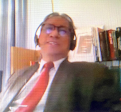by Azly Rahman
Anderson (1998) narrates a poignant historical account of the education of Black teachers in the South between 1860-1935 chronicling particularly the inherent power relations embedded in the Tuskegee-Hampton model of industrial training. If, borrowing from the notion that teaching is a subversive act, Anatole France’s idea of teaching as the awakening of curious, young minds, and Gramscian notion of “organic intellectuality”, I conclude from the historical-materialistic perspective that the Black teacher is blatantly doomed to serve the interest of the imperialist—capitalist ruling class. If there is a paradigm to situate such a dehumanizing conception of how a Black teacher should be educated, it is one which would relegate them into having the minimum basic education enough to help socially reproduce their people into menial –industrial laborers chained to the shop floor of the industrial capitalists or trained to be good servants in the mansions of powerful and wealthy white, Anglo-Saxon Protestants. The Hampton-model and the curriculum cemented this colonizer-colonized ideal with its proponents’ faith in elevating the Blacks to yet another level of institutionalized slavery (Chapter 2). Even if there exist an apparent ideological “tug-of-war” between the camps of Booker T. Washington and W.E.B. DuBois pertaining to the insistence for a liberal curriculum, the referees and the sponsors in these are strategically imperial-capitalist so-called “philanthropists”. I state the word “imperial” to also refer to the Hampton model being excitedly transferred to Liberia, Africa around that that time which must also be looked at historically as a phase in British-oligopolic-inspired, American-styled colonialism.
Such projects too happened in the case of the transfer of vocational education on the Philippines and in Latin American countries wherein American industrialists see the Third World as a huge and dirt cheap pool of labor not only to provide bread on the table of the industrialized nation-states but also the help speed up the production capacity of the then emerging automobile and canning industries. Kleibard’s (1995) account of the ideal is about the struggle of white, Anglo-Saxon Protestant theorists in a “tug-of-war” on how best to groom America’s political-economic elite. His is about the search for the one best system of, among others, to train teachers to teach the masses to acquire good habits of the heart, mind, and body so that they can be socially reproduced to run the industrial-based economy.
Kleibard’s arm-chair styled of doing history his and “issue versus non-issue” treatment of what constitute a humanistic struggle for the teachers, did not give any account of the national and international dimension of capitalist formation and contradictions during the early and middle period of American rise to world industrialism. The ideal of the Black teacher, in Kleibard’s account, is almost non-existent. His narratives revolve around which “towering figure” in which ideological camp goes to war aided by which individuals and institutions occupying power and authority and controlling the means of base and superstructural production. Absent is the perspective of the “people’s history of the United States” and particularly relevant to this discussion is the voice of teachers, be they Black, white, or in-between. But aside the discussions above, a question remains: can these accounts still be categorized as attempts towards “Othering” in curriculum theorizing? Can it not be shameful of me to use a poststructural critique on historizing and my reflecting upon such a phase in history, as what is important is not to become apologists to what happened in history but rather, to discern beyond historicity the praxical judgement of it.

No comments:
Post a Comment